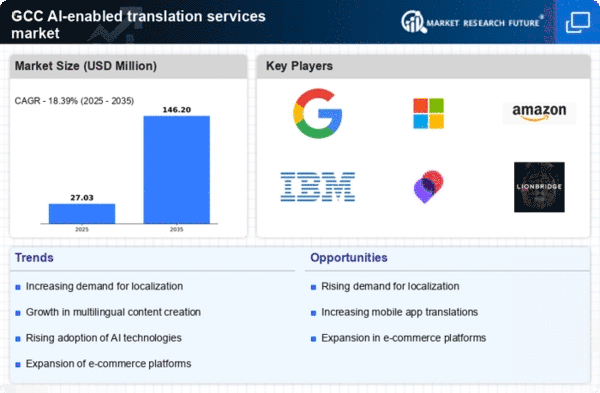Technological Advancements in AI
Technological advancements in artificial intelligence are significantly influencing the ai enabled-translation-services market. Innovations in natural language processing (NLP) and machine learning algorithms are enhancing the accuracy and efficiency of translation services. In the GCC, where diverse languages and dialects coexist, these advancements are crucial for providing high-quality translations. The market is expected to witness an increase in the deployment of AI-driven tools that can learn and adapt to specific linguistic nuances. This evolution is likely to attract more businesses to invest in ai enabled-translation-services, as they seek to leverage cutting-edge technology to improve communication and operational efficiency.
Growing Focus on Customer Experience
A growing focus on customer experience is significantly impacting the ai enabled-translation-services market. Businesses in the GCC are increasingly recognizing the importance of providing personalized and localized experiences to their customers. This trend is particularly relevant in sectors such as retail and hospitality, where customer satisfaction is directly linked to effective communication. As a result, companies are likely to adopt ai enabled-translation-services to ensure that their messaging resonates with diverse audiences. The emphasis on customer experience is expected to drive market growth, as organizations seek to differentiate themselves in a competitive landscape.
Rising Demand for Multilingual Content
The AI-enabled translation services market is experiencing a notable surge in demand for multilingual content across various sectors in the GCC. As businesses expand their reach, the necessity for effective communication in multiple languages becomes paramount. This trend is particularly evident in industries such as tourism, education, and e-commerce, where customer engagement relies heavily on localized content. According to recent estimates, the GCC region's digital content market is projected to grow at a CAGR of approximately 15% over the next five years. This growth is likely to drive the adoption of ai enabled-translation-services, as companies seek to enhance their global presence and cater to diverse audiences.
Increased Cross-Border Trade Activities
The ai enabled-translation-services market is benefiting from the increase in cross-border trade activities within the GCC. As trade agreements and economic collaborations expand, businesses are required to communicate effectively with partners and customers across different linguistic backgrounds. This necessity is driving the demand for translation services that can facilitate seamless interactions. The GCC's trade volume is projected to reach approximately $1 trillion by 2026, indicating a robust market for ai enabled-translation-services. Companies are likely to invest in these services to ensure compliance with international standards and enhance their competitiveness in the global market.
Government Initiatives Supporting Digital Transformation
Government initiatives aimed at promoting digital transformation in the GCC are playing a pivotal role in the growth of the ai enabled-translation-services market. Various countries in the region are implementing strategies to enhance their digital infrastructure, which includes support for AI technologies. For instance, the UAE's Vision 2021 emphasizes the importance of innovation and technology in driving economic growth. Such initiatives are likely to create a conducive environment for the adoption of ai enabled-translation-services, as businesses align with government objectives to enhance their digital capabilities and improve service delivery.

















